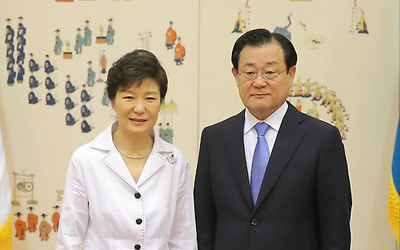- California Assembly OKs highest minimum wage in nation
- S. Korea unveils first graphic cigarette warnings
- US joins with South Korea, Japan in bid to deter North Korea
- LPGA golfer Chun In-gee finally back in action
- S. Korea won’t be top seed in final World Cup qualification round
- US men’s soccer misses 2nd straight Olympics
- US back on track in qualifying with 4-0 win over Guatemala
- High-intensity workout injuries spawn cottage industry
- CDC expands range of Zika mosquitoes into parts of Northeast
- Who knew? ‘The Walking Dead’ is helping families connect
Park names spy chief as new chief of staff

President Park Geun-hye introduces South Korea’s spy chief Lee Byung-kee as her new Chief of Staff. (Yonhap)
SEOUL (Yonhap) — President Park Geun-hye named South Korea’s spy chief as her new chief of staff on Friday, her spokesman said, the latest in a series of reshuffles meant to start anew, following public backlash over a string of policy blunders.
The appointment of Lee Byung-kee as the presidential chief of staff underscored Park’s intention of filling key posts with her confidants. It came as a surprise as he was named to lead the National Intelligence Service (NIS), South Korea’s top spy agency, less than a year ago.
“We expect the new chief of staff to open a path of communication between the presidential office and the people,” presidential spokesman Min Kyung-wook said.
Park has long been branded by her critics as “uncommunicative” for allegedly refusing to listen to what critics and others have to say and insisting on only what she believes to be right.
Lee, a former career diplomat, served as South Korea’s top envoy to Japan and as a chief protocol secretary for Roh Tae-woo, the general-turned-president who led the country from 1988 to 1993.
“I have a heavy responsibility as I assume the post at a time of difficult situations,” Lee told Yonhap news agency.
Park also named Lee Byung-ho, a 75-year-old former No. 2 spy official, as her new NIS director, Min said. Lee worked for the Agency for National Security Planning, the predecessor of the NIS, for 26 years and served as Seoul’s ambassador to Malaysia.
The spy chief nominee has to go through a parliamentary confirmation hearing, though it is widely seen as a formality because his nomination does not require approval from the National Assembly.
The announcement came days after Park accepted the resignation of her unpopular chief of staff, Kim Ki-choon. She had been under pressure to sack Kim, a septuagenarian politician, over a series of accidents, including the leak of sensitive presidential documents.
Also announced were the new senior presidential press secretary, three special advisors in charge of political affairs and another special advisor handling press.
Earlier this month, Park also carried out a Cabinet shake-up that affected the country’s financial regulator and three ministries, including the unification ministry handling inter-Korean affairs.
The Cabinet shake-up came a day after ruling party lawmaker Lee Wan-koo, Park’s choice for prime minister, won parliamentary endorsement, despite public distrust of the nominee accused of various ethical lapses.
In South Korea, it has been common to conduct a Cabinet reshuffle or other personnel changes in a bid to overcome crises and start afresh with a new lineup.
















